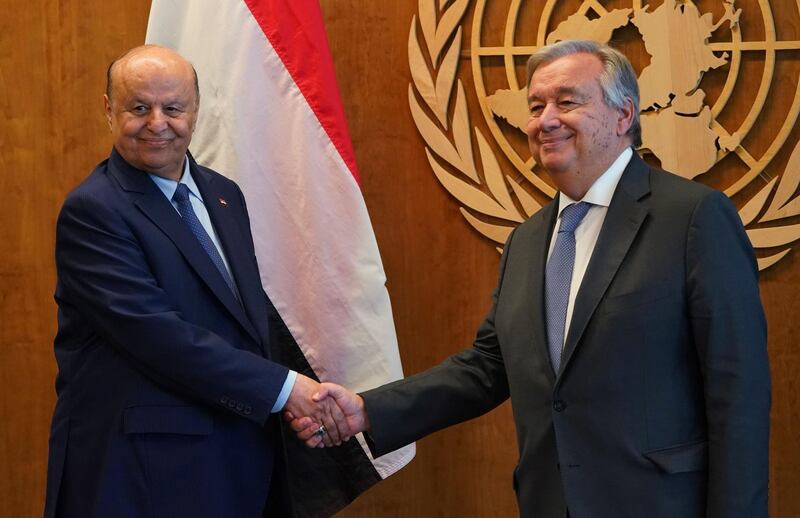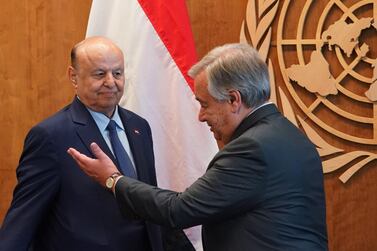The UN is committed to serving as an “impartial and trusted” broker in Yemen’s peace process, its Secretary General Antonio Guterres said in response to a complaint from the country’s government that his envoy was siding with the Houthi rebels.
President Abdrabu Mansur Hadi wrote to Mr Guterres last week with a list of “violations” said to have been carried out by UN special envoy Martin Griffiths in his attempts to implement a peace deal reached between the warring sides in Sweden last December.
In a letter to Mr Hadi, which was seen by The National, the UN chief said his envoy would "redouble efforts" to support the parties in delivering on their commitments made in Stockholm.
Mr Griffiths will do so in “a manner that is balanced and fully supportive of achieving a peaceful and lasting political solution,” Mr Guterres said.
The government has accused Mr Griffiths of treating the “rebels as a de facto government and as an equal to the legitimate and elected government” of Yemen.
In his letter, Mr Hadi said that his government could stop dealing with the UN envoy.
“I can no longer tolerate the violations committed by the special envoy, which threaten prospects for a solution,” read the five-page letter, a copy of which was released to reporters on Thursday.
But Mr Guterres said he would remain “steadfast” and personally involved in efforts to end the war, now in its fifth year.
“The activities of my special envoy are in pursuit of the mandate entrusted to him by the parties and the Security Council,” the UN chief said.
“Fulfilling the mandate will need continued co-operation of the government of Yemen, and you personally, for which I am grateful.”
Tensions between Mr Hadi’s government and the UN increased last week after Mr Griffiths told the Security Council that the rebels had withdrawn from the Red Sea ports of Hodeidah, Al Saleef and Ras Isa – one of the key points in the ceasefire agreement reached in Sweden.
The Yemeni government has objected to the withdrawal being carried out without its representatives being present, as was agreed with the head of the UN observer mission in Hodeidah.
It accused Mr Griffiths of turning a blind eye to violations by the rebels and alleged that the Houthis had kept their fighters at the ports by disguising them in coastguard and police uniforms.
“With regard to the implementation for the Stockholm Agreement, and particularly the Hodeidah agreement, I would like to assure you that every effort will be made to maintain the impartial stance that is expected of the United Nations,” Mr Guterres said.
But he acknowledged that the peace process in Yemen was “challenging and complex”.
Hodeidah is the point of entry for most of Yemen’s commercial goods and aid supplies and placing its ports under UN supervision is considered vital to speeding up the delivery of much-needed food and medical supplies.
Yemeni officials told The National that Mr Griffiths had lost his ability to be a neutral arbitrator when he endorsed the rebels' withdrawal.
On Wednesday, the Yemeni parliament urged the government to halt negotiations with the UN until it reviewed the supposed Houthi withdrawal from Hodeidah.







